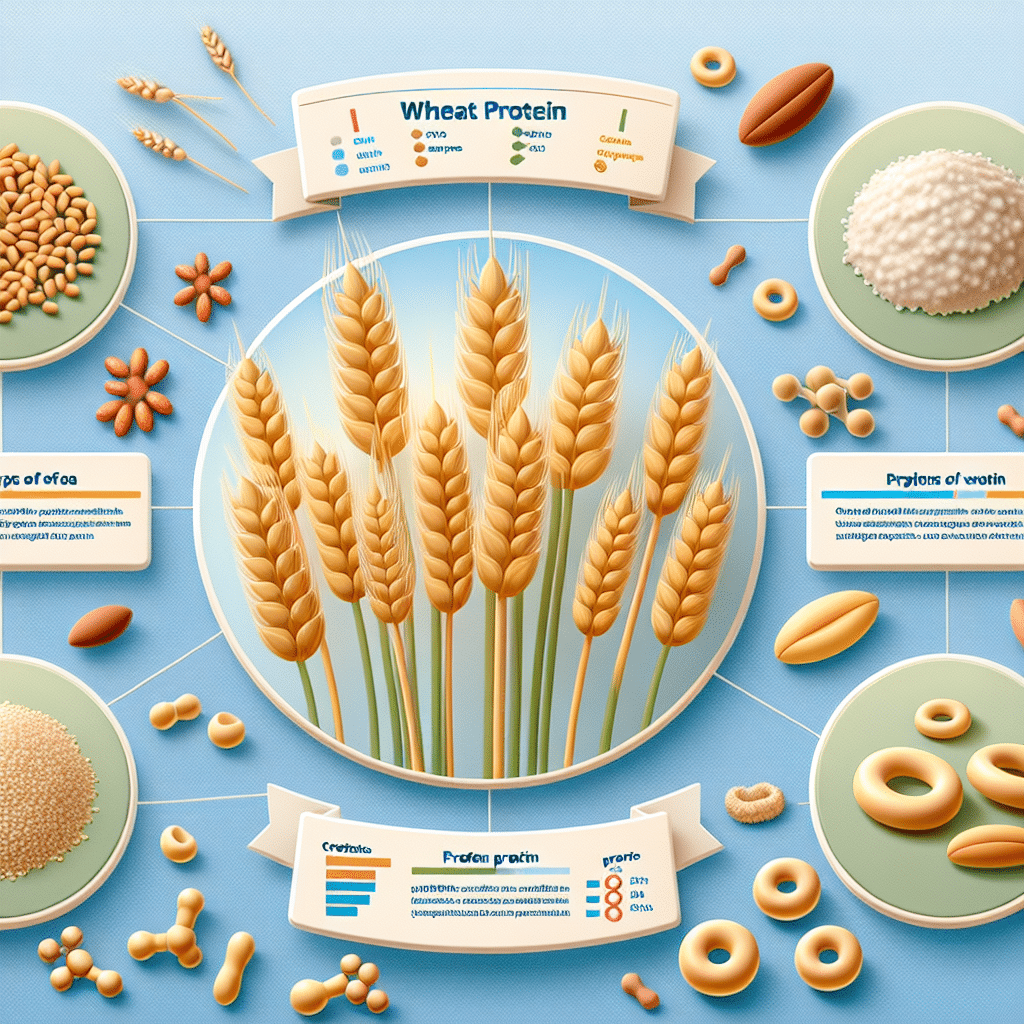What Are The 4 Types Of Wheat Protein?
-
Table of Contents
- Understanding the 4 Types of Wheat Protein: A Comprehensive Guide
- 1. Glutenin: The Strength Provider
- 2. Gliadin: The Extensibility Factor
- 3. Albumins: The Water-Soluble Proteins
- 4. Globulins: The Storage Proteins
- Applications and Health Considerations
- Conclusion: The Versatile World of Wheat Protein
- Discover ETprotein’s High-Quality Protein Products
Understanding the 4 Types of Wheat Protein: A Comprehensive Guide

Wheat is one of the most widely consumed grains in the world, serving as a staple food for a significant portion of the global population. It is not only a source of carbohydrates but also a rich provider of protein. Wheat protein is a complex mixture of various protein types, each with unique properties and applications. In this article, we will delve into the four primary types of wheat protein, exploring their characteristics, uses, and benefits.
1. Glutenin: The Strength Provider
Glutenin is one of the two main components of gluten, the protein complex that gives wheat its unique baking properties. Glutenin molecules are large and responsible for the elasticity and strength of dough. When flour is mixed with water, glutenin proteins cross-link to form a stretchy network that can trap air bubbles, leading to the rise and structure of baked goods.
- High Molecular Weight (HMW) Glutenin: Contributes to the elasticity and strength of the dough.
- Low Molecular Weight (LMW) Glutenin: Works in conjunction with HMW to enhance dough properties.
Glutenin is particularly important in the production of bread, where the ability to retain gas is crucial for the loaf’s volume and texture. The quality of glutenin can vary depending on the wheat variety, which is why certain strains are preferred for bread-making.
2. Gliadin: The Extensibility Factor
Gliadin, the other major component of gluten, is responsible for the extensibility and viscosity of dough. Unlike glutenin, gliadin proteins are smaller and contribute to the dough’s ability to stretch without snapping. This property is essential for the production of pastries and other baked goods that require a tender crumb.
- Alpha-Gliadins: Associated with dough stickiness and may play a role in celiac disease.
- Beta-Gliadins: Contribute to the extensibility of the dough.
- Gamma-Gliadins: Impact dough strength and fermentation tolerance.
- Omega-Gliadins: Affect dough’s rheological properties.
Gliadins are also implicated in gluten-related disorders such as celiac disease, as they contain sequences that can trigger an immune response in susceptible individuals.
3. Albumins: The Water-Soluble Proteins
Albumins are a class of proteins that are soluble in water and represent a minor fraction of wheat protein. They do not contribute to gluten formation but play other roles in the plant’s physiology, such as enzyme activity and metabolic regulation. In the context of food, albumins can act as natural emulsifiers and foaming agents, which can be useful in products like meringues and foams.
- Leucosin: An example of a wheat albumin with potential health benefits.
While not as prominent in the culinary properties of wheat, albumins can have nutritional significance due to their diverse amino acid composition.
4. Globulins: The Storage Proteins
Globulins are another group of water-soluble proteins found in wheat. They serve primarily as storage proteins, storing amino acids for the plant’s growth and development. In the human diet, globulins provide essential amino acids that the body cannot synthesize on its own.
- Edestin: A type of globulin that may have health-promoting properties.
Although globulins are less abundant than gluten proteins, they are an important part of the nutritional profile of wheat.
Applications and Health Considerations
The different types of wheat protein have a wide range of applications in the food industry. Glutenins and gliadins are particularly valued in baking, while albumins and globulins can be used in specialized food products. However, it is important to note that wheat proteins, especially gluten, can cause health issues for individuals with gluten intolerance or celiac disease. For these individuals, consuming wheat protein can lead to adverse health effects, necessitating a gluten-free diet.
Conclusion: The Versatile World of Wheat Protein
In summary, the four types of wheat protein—glutenin, gliadin, albumins, and globulins—each play distinct roles in the culinary and nutritional aspects of wheat. Understanding these proteins is crucial for both food scientists and consumers, as it allows for the optimization of wheat’s functional properties in food products and informs dietary choices for those with sensitivities. As research continues, we may discover even more about the potential applications and health implications of these diverse proteins.
Discover ETprotein’s High-Quality Protein Products
If you’re looking for premium wheat protein products, ETprotein offers a range of solutions to meet your needs. Their commitment to quality and customer satisfaction makes them a top choice for consumers and manufacturers alike. Explore their offerings and experience the benefits of high-quality wheat protein in your products.
About ETprotein:
ETprotein, a reputable protein and L-(+)-Ergothioneine (EGT) Chinese factory manufacturer and supplier, is renowned for producing, stocking, exporting, and delivering the highest quality organic bulk vegan proteins and L-(+)-Ergothioneine. They include Organic rice protein, clear rice protein, pea protein, clear pea protein, watermelon seed protein, pumpkin seed protein, sunflower seed protein, mung bean protein, peanut protein, and L-(+)-Ergothioneine EGT Pharmaceutical grade, L-(+)-Ergothioneine EGT food grade, L-(+)-Ergothioneine EGT cosmetic grade, L-(+)-Ergothioneine EGT reference grade and L-(+)-Ergothioneine EGT standard. Their offerings, characterized by a neutral taste, non-GMO, allergen-free attributes, with L-(+)-Ergothioneine purity over 98%, 99%, cater to a diverse range of industries. They serve nutraceutical, pharmaceutical, cosmeceutical, veterinary, as well as food and beverage finished product distributors, traders, and manufacturers across Europe, USA, Canada, Australia, Thailand, Japan, Korea, Brazil, and Chile, among others.
ETprotein specialization includes exporting and delivering tailor-made protein powder and finished nutritional supplements. Their extensive product range covers sectors like Food and Beverage, Sports Nutrition, Weight Management, Dietary Supplements, Health and Wellness Products, and Infant Formula, ensuring comprehensive solutions to meet all your protein needs.
As a trusted company by leading global food and beverage brands and Fortune 500 companies, ETprotein reinforces China’s reputation in the global arena. For more information or to sample their products, please contact them and email sales(at)ETprotein.com today.














